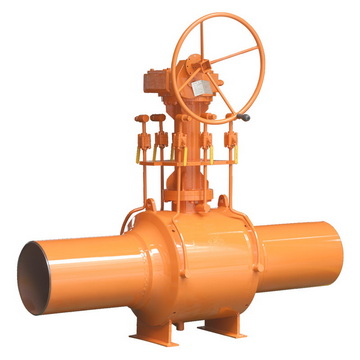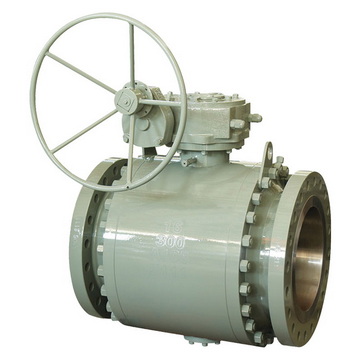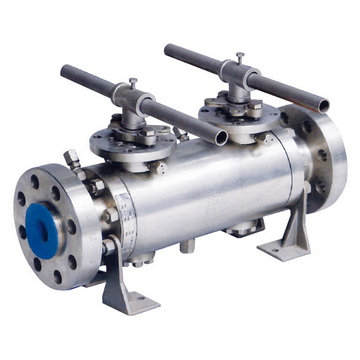Why Stainless Steel Ball Valves Are a Smart Investment for the Long Term?
Content Menu
● The Fundamentals of Stainless Steel Ball Valves
● Why Stainless Steel is the Ideal Material
>> Exceptional Corrosion Resistance
>> Superior Strength and Durability
● Wide Range of Industrial Applications
>> Offshore Drilling Platforms
● Different Types of Stainless Steel Ball Valves and Their Unique Advantages
>> Trunnion (Ear Pin) Ball Valve
● The Value of Choosing a Specialized OEM Manufacturer
● Maintenance and Installation Best Practices
● Frequently Asked Questions (FAQ)
>> 1. What makes stainless steel ball valves better than other valve materials?
>> 2. Can stainless steel ball valves be used in offshore applications?
>> 3. What are the differences between floating ball valves and trunnion ball valves?
>> 4. How often should stainless steel ball valves be maintained?
>> 5. Do you offer customized stainless steel ball valve designs?
In the landscape of modern industry, the demand for reliable and efficient flow control components has never been greater. Valves form the backbone of fluid handling systems, and selecting the right valve can significantly impact operational efficiency, safety, and maintenance costs. Among various valve types, stainless steel ball valves have earned their reputation as a top-tier solution, especially in industries where performance under pressure and corrosive environments is critical.
Manufactured from high-quality stainless steel, these ball valves are widely used in sectors such as oil and gas upstream, midstream, and downstream, seawater desalination facilities, and offshore drilling platforms. This article explores why investing in stainless steel ball valves equates to a smart decision with long-lasting benefits and how leveraging OEM expertise from a dedicated Chinese factory can enhance your supply chain and customization options.

The Fundamentals of Stainless Steel Ball Valves
At their core, stainless steel ball valves operate utilizing a spherical ball that rotates within the valve body to control the flow of liquids or gases. When the valve is opened, the hollow center of the ball aligns with the pipeline, allowing fluid to pass with minimal resistance. When closed, the solid part of the ball blocks the flow entirely, providing tight sealing and instant shutoff capability.
The choice of stainless steel as the core material is fundamental to the valve's durability and versatility. Stainless steel's inherent properties—particularly its corrosion resistance, mechanical strength, and temperature tolerance—set these valves apart from those fabricated from cast iron, brass, or carbon steel.
Several designs are commonly used within the product spectrum including floating ball valves, trunnion-mounted (also called ear pin) ball valves, and top entry ball valves. Each design caters to specific industrial needs, from lightweight applications to high-pressure and large-bore piping systems.
Why Stainless Steel is the Ideal Material
Exceptional Corrosion Resistance
One of the most compelling reasons to select stainless steel is its remarkable resistance to corrosion. In critical industries, valves often encounter corrosive chemicals, saltwater, and extreme environmental conditions that can degrade lower-grade materials rapidly. The chromium content in stainless steel forms a durable oxide layer that prevents rust and pitting, preserving the valve's structural integrity.
In offshore installations and seawater desalination plants, corrosion is a primary concern due to exposure to saline environments and chlorides. Stainless steel ball valves excel here, maintaining performance and safety over extended service periods, thereby reducing frequent replacements and operational hazards caused by valve failure.
Superior Strength and Durability
Stainless steel ball valves are engineered to withstand high pressures and a wide temperature range without deforming or leaking. This robust mechanical strength means they can handle the rigorous demands of oil and gas extraction, refining processes, and chemical handling, where system pressure fluctuations can be drastic and continuous.
Moreover, stainless steel's strength contributes to enhanced wear resistance, making valves less prone to damage caused by solid particles or abrasive fluids. As a result, these valves require less frequent servicing and provide consistent performance throughout their lifetime.
Temperature Tolerance
Industry processes often involve both cryogenic and high-temperature applications. Stainless steel supplies the necessary heat tolerance with various grades suitable for different temperature ranges. This versatility ensures that stainless steel ball valves can be deployed in pipelines transporting superheated steam, hot refined hydrocarbons, or liquefied gases without compromising safety or efficiency.
Wide Range of Industrial Applications
Oil and Gas Industry
The oil and gas sector is one of the most demanding when it comes to valve performance. From upstream exploration and production to downstream refining and distribution, valves must offer unbeatable reliability. Stainless steel ball valves are widely favored as they handle high-pressure fluids, volatile hydrocarbons, and corrosive by-products with ease.
Their swift quarter-turn operation enables emergency shutoffs critical in hazardous environments, while the strong seals prevent leaks of flammable or toxic substances, upholding safety and environmental protection standards.
Seawater Desalination
Desalination involves processing vast quantities of seawater, which is highly corrosive due to its salt content. Valves exposed to such media require materials that do not deteriorate rapidly. Stainless steel ball valves maintain their integrity in this environment, ensuring uninterrupted operation and minimizing maintenance downtime.
They also contribute to controlling chemical feed lines and freshwater distribution networks within desalination plants, where precise and reliable flow regulation is essential.
Offshore Drilling Platforms
Offshore platforms operate under extreme environmental conditions, including salt spray, high humidity, and fluctuating temperatures. Stainless steel ball valves are essential components onboard, offering mechanical robustness and corrosion resistance vital for safety and operational continuity. The ability to perform under high pressures and resist marine corrosion significantly enhances platform efficiency and worker safety.
Other Industrial Uses
Beyond energy and water processing, stainless steel ball valves are increasingly found in chemical manufacturing, pharmaceuticals, food and beverage industries, and marine applications. Their hygienic surface finish and resistance to contamination make them ideal for sanitary pipelines and cleanroom environments as well.

Different Types of Stainless Steel Ball Valves and Their Unique Advantages
Floating Ball Valve
The floating ball valve is the most common design and is especially suited for small to medium-sized diameters and low to moderate pressures. The ball “floats” between two elastomeric seats and is slightly pushed downstream by the pressure of the fluid exiting the valve. This action provides a tight seal. Floating ball valves are widely used because of their simplicity, reliability, and cost-effectiveness.
Trunnion (Ear Pin) Ball Valve
For larger piping systems or high-pressure scenarios, trunnion ball valves are preferable. These valves feature a fixed ball anchored by trunnions on the top and bottom. This support absorbs the force of fluid pressure, preventing the ball from moving and reducing the operating torque. This design enhances performance for large-diameter pipelines, ensuring ease of operation even under severe pressure conditions.
Top Entry Ball Valve
The top entry design enables technicians to perform maintenance or inspection without dismantling the valve from the pipeline, greatly reducing downtime and facilitating safety procedures. This type is favored in critical service areas where valve upkeep must not interrupt the production process.
The Value of Choosing a Specialized OEM Manufacturer
Opting for an experienced Chinese OEM factory like ours that specializes in high-quality stainless steel ball valves brings multiple benefits:
- Customization: Tailor the valve specifications such as size, pressure rating, end connections, and material grades to meet industry-specific standards.
- Quality Assurance: We deploy advanced manufacturing techniques and stringent quality control protocols to ensure consistency and reliability in every valve.
- Competitive Pricing: Our optimized design and efficient production process deliver cost advantages without compromising product integrity.
- Global Experience: Serving clients worldwide, including leading brand owners, wholesalers, and manufacturers, equipping us with insights to innovate and improve.
These advantages translate directly to better lifecycle performance and more streamlined operations for customers.
Maintenance and Installation Best Practices
Maximizing the lifespan of stainless steel ball valves depends heavily on correct installation and routine maintenance.
- Ensure pipelines are flushed and free from debris before installation to prevent damage to precision valve seats.
- Use appropriate tools and torque settings to avoid over-tightening or damaging valve components.
- Implement scheduled inspections focusing on wear of seals, seats, and lubrication points.
- Train maintenance personnel on recommended procedures to detect early signs of wear or malfunction.
Investing in operator training and maintenance infrastructure enhances valve uptime and system reliability.
Conclusion
Choosing stainless steel ball valves is more than just selecting a product—it's a strategic investment in operational longevity, safety, and efficiency. Thanks to their outstanding corrosion resistance, mechanical strength, and adaptability to extreme pressures and temperatures, these valves are indispensable across oil and gas, seawater desalination, offshore drilling, and other industrial sectors.
Partnering with a trustworthy OEM manufacturer that focuses on tailored stainless steel ball valve solutions ensures access to state-of-the-art products designed to exacting specifications and delivered with competitive advantages. By integrating these durable valves into your system, you reduce downtime, lower maintenance expenses, and safeguard against environmental and operational risks. This makes stainless steel ball valves a wise choice that pays dividends over the long term.

Frequently Asked Questions (FAQ)
1. What makes stainless steel ball valves better than other valve materials?
Stainless steel offers superior resistance to corrosion, wear, and extreme temperatures compared to brass, carbon steel, or plastic. This enhances valve longevity and reliability in harsh industrial environments, leading to fewer replacements and safer operations.
2. Can stainless steel ball valves be used in offshore applications?
Absolutely. Their corrosion resistance to saltwater and ability to withstand the mechanical stresses of offshore environments make stainless steel ball valves the preferred choice for platforms and marine pipelines.
3. What are the differences between floating ball valves and trunnion ball valves?
Floating ball valves use pressure to press the ball against the downstream seat, suitable for smaller, low-pressure systems. Trunnion ball valves support the ball on fixed pins for larger, high-pressure systems, reducing operational torque and enabling easier handling for large-diameter pipelines.
4. How often should stainless steel ball valves be maintained?
Maintenance frequency depends on the application but generally involves biannual to annual inspection and lubrication. Harsher environments may require more frequent checks to prevent premature wear and ensure leak-tight seals.
5. Do you offer customized stainless steel ball valve designs?
Yes. We provide OEM customization to meet specific industry demands including different pressure classes, sizes, materials, and special features tailored to your project requirements.
Hot tags: Stainless Steel Ball Valves Long Term Investment, Benefits Of Stainless Steel Ball Valves, Durable Stainless Steel Ball Valves, Cost Effective Stainless Steel Ball Valves, Why Invest In Stainless Steel Ball Valves, Longevity Of Stainless Steel Ball Valves, Stainless Steel Ball Valves For Industrial Use, Smart Choice Stainless Steel Ball Valves, High Performance Stainless Steel Ball Valves, Reliability Of Stainless Steel Ball Valves